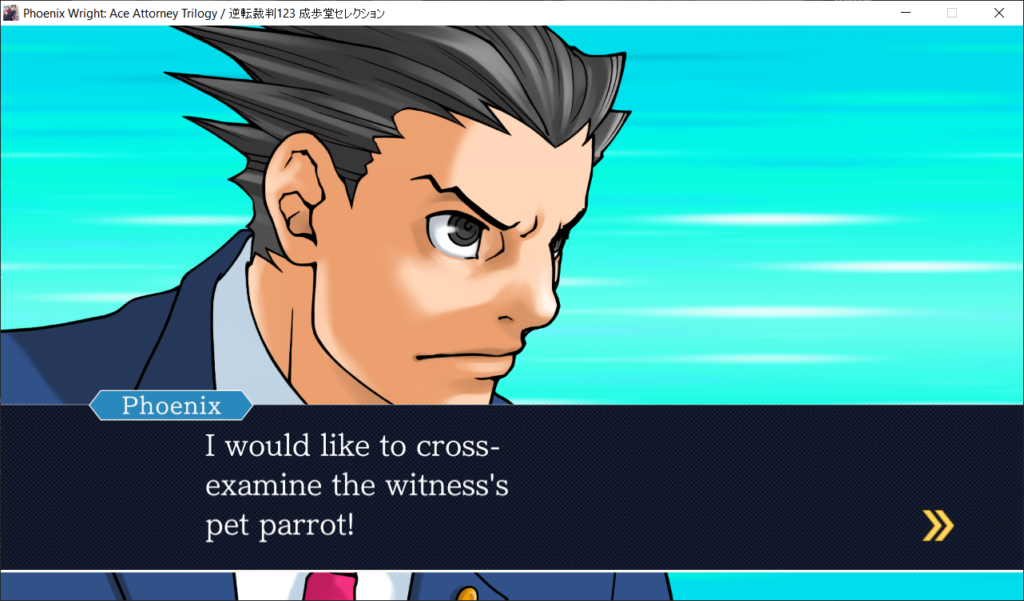
Objection! Step into the shoes of rookie defence lawyer Phoenix Wright as he takes on a procession of increasingly outlandish and convoluted cases. Investigate murders and defend your clients in the courtroom, all in the hopes of obtaining that vital “Not Guilty” verdict.
The Phoenix Wright series has been around for a while, but while I was well aware of all the tropes, I had never played any of the games for myself. For years, my DS copy of the first game sat unloved on the shelf – and even now, it remains there, because by the time I did get around to playing it, I went for the HD trilogy on Steam instead.
The Phoenix Wright formula is pretty straightforward. Each game is divided into four or five episodes, the first of which is a tutorial to show you how the game works. The remaining episodes begin with a crime being committed, for which the wrong person is invariably arrested. No matter how hopeless the case or conclusive the evidence against them seems to be, your goal is to prove their innocence.
Gameplay is split into two parts. During Investigations, you move between different areas, searching for evidence and questioning people connected to the case. Occasionally, extra features are available – in a couple of cases you get access to a metal detector, while the bonus case originally added for the DS port of the first game lets you dust for fingerprints and use luminol to search for bloodstains. While it’s clear that these last two features were added to make use of the DS touch screen and microphone, it does feel odd to have new gameplay elements introduced in what effectively is post-game content.
From the second game onward, Investigation mode also introduces the “Psyche-Lock” system. Now Phoenix has the ability to detect when people are lying, enabling him to confront them with evidence and force them to tell the truth.
Once the investigation is over, it’s time to go to trial. Here, your job is to cross examine witnesses, using the evidence you’ve gathered to point out the logical flaws in their testimony. Make a mistake, and the judge will impose a penalty – too many penalties and it’s game over. Even when you make some headway towards the truth, the prosecution will be quick to thwart your progress.
It’s clear that the Phoenix Wright games fill a niche all their own, but the question remains – are they actually fun? The answer is yes, but with a few caveats. When things are going well, the game is highly enjoyable – there’s immense satisfaction to be had in presenting a piece of evidence that blows a witness’s testimony wide open. But equally, there are times when the game can feel frustrating and even stressful. Maybe you’ve already figured out the truth behind the case, but are forced by the game’s limited logic to proceed through some intermediate steps first. Maybe you have no idea how to proceed, because you took a break partway through a case and have since forgotten an obscure piece of information required to figure out the lie in a testimony. When situations like these come along, it’s down to you and your sense of gaming honour as to whether exhaust all the possibilities, or just refer to a walkthrough.
Story and Characters
If you’re looking for a sensible and down-to-earth experience, then the Phoenix Wright games are not for you. This is a game where the prosecution will whip and throw cups of coffee at you, while your spirit medium assistant summons the spirit of your dead mentor to assist you. Witnesses and defendants are equally outlandish. It’s all very colourful and entertaining, but don’t expect anything close to realism here.
Similarly, this game is not meant to be a primer on the criminal justice system. The Phoenix Wright series take place in a future where all trials must be concluded within three days, and murder is always a capital offence. Not only that, but in this world, perjury, withholding evidence, and bursting in at the last minute to interrupt a verdict are not only common, but pretty much expected.
Audiovisual
Visually, Phoenix Wright is not the most impressive game out there. It’s presented in visual novel style, with a bright and cartoonish look. The HD remake loses a lot of the charm of the original pixel art, and while I grew to like many of the character designs, it did take some getting used to.
The background music is inoffensive at worst, and is frequently pleasingly retro. Whether intentionally or not, some tracks were evocative of SNES classics like Chrono Trigger.
Final Thoughts
Although it can be stressful and frustrating at times, Phoenix Wright is definitely worth your time. If you want the satisfaction of courtroom cross-examinations without the effort of spending years at law school, then this is the game for you.
